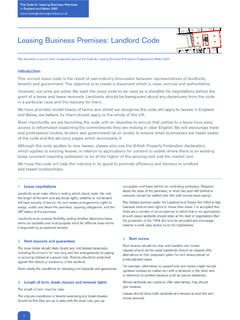Transcription of Guide to improvements Consent, rent review and ...
1 Issued January 2013 Guide to improvements consent , rent review and compensation for business tenants 1. What does the lease say? Many leases are drafted in such a way that different types of alteration may or not require the Landlord s consent , depending on their nature. Care should be taken to ensure that any procedures under the lease are observed, and that the alterations do not create a trespass, for example by altering a structure which does not form part of the area actually let. 2. Statutory Intervention There are two sets of statutory provisions which relate to tenants alterations, even if the lease prohibits or restricts alterations and improvements . (a) The Landlord and tenant Act 1927 Act section 3. This enables a business tenant to carry out improvements which are prohibited by his lease and which improve the letting value of the premises. It should be noted that if the tenant uses this procedure the landlord can do the work itself and increase the rent. (b) 1927 Act section 19(2).
2 This section adds a proviso to any lease which prohibits improvements without the Landlord s consent that the consent shall not be unreasonably withheld but: (i) The Landlord can charge a reasonable sum to cover any damage to or diminution in the value of the premises or neighbouring property of the Landlord; (ii) The Landlord can charge for legal and other expenses it incurs in connection with the consent ; (iii) If the improvement does not add to the letting value of the premises the Landlord can, if it is reasonable to do so, require the tenant to reinstate. 19(2) is not restricted to improvements which add to the letting value of the premises (cf section 3) Most alterations are going to be improvements and it is very difficult for the landlord to be reasonable in withholding consent . The correct approach for the landlord is to require payment of reasonable compensation to cover the fall in value. See Lambert v Woolworth 1938. Issued January 2013 3. compensation A tenant who has complied with the 1927 Act may be able to obtain compensation for improvements which add to the letting value of the premises.
3 The compensation is determined by the County Court However compensation is not payable for improvements made: (1) under an obligation to the Landlord (ie the tenant has agreed to carry out work as part of the terms of the lease ) or pursuant to a statutory obligation (eg required improvements under the Disability Discrimination rules), or (2) less than 3 years before the end of the lease The tenant must follow a procedure as follows: (a) The tenant must serve written notice on the Landlord of his intention to make the improvement with a specification and plan. It is best to refer to the 1927 Act in the notice, even though this requirement is not certain, and its absence may not be fatal. (b) The Landlord has three months to object. If he does the tenant may refer the matter to the County Court (c) The Court may certify that the improvement is a proper one if: (i) it would add to the letting value of the premises at the end of the lease (ii) it is reasonable and suitable to the character of the premises (iii) it will not diminish the value of the property of the Landlord or any superior Landlord However the Court cannot certify the improvement as being a proper one if the Landlord has offered to do the work in return for a reasonable increase in the rent (unless the Landlord then fails to carry out the work).
4 There is a procedure for claiming the compensation towards the end of the lease , and if this is not complied with strictly, the right to compensation is lost. The NOTICE OF CLAIM and its amount must be made: (1) within 3 months after a notice to quit from the Landlord (s 25 notice), or (2) within 3 months after a notice from the tenant claiming a new tenancy (s 26 request), or (3) within 3 months after forfeiture, or (4) between six months and three months BEFORE the lease ends by the lease merely running out (assume that would include the exercise of a break right). This means the contractual term even of there is likely to be a holding over. Issued January 2013 The level of compensation is the lower of the addition to the value of the premises and the cost of the improvement at the prices at the end of the lease . The tenant must choose between taking compensation and taking a new lease . The compensation is only payable on quitting. If a new lease is taken the improvements are not rentalised, but the compensation itself is lost it cannot be carried over to the new lease 4.
5 Dealing with alterations on Rent review Most rent review clauses contain a direction that any effect of alterations carried out by or at the expense of the tenant will be disregarded. However this disregard often does not cover alterations which: (a) were not made during the lease term; (b) were made under an obligation by the tenant to do so; (c) were made without the Landlord s consent (whether or not the lease required any consent - and retrospective consent is not sufficient); or (d) were made by an undertenant or some other person apart from the tenant . On a renewal of the lease , improvements carried out by the tenant (or an earlier tenant where the chain of tenants has not been broken by the Landlord getting the premises back or business activity ceasing) up to 21 years before or in the current tenancy (whichever is the earlier) For more information about the above or any other Commercial Property Matters contact the Property Team at Nantes Solicitors: Bridport 01308 422313 Dorchester 01305 250100 Weymouth 01305 771000



